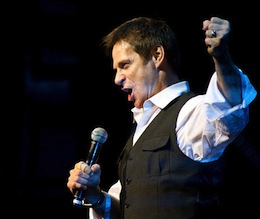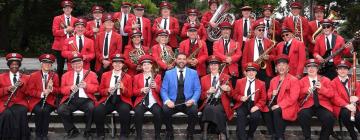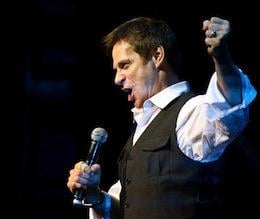
In some ways, Simon Keenlyside has the best of both worlds: He’s passionate about singing, and he’s passionate about the world of nature. Over the years, he’s been able to combine his two loves while making a name for himself as one of the better, more charismatic baritones around. While you probably won’t get a chance to go hiking with him, you can enjoy his musical side through San Francisco Performances on Oct. 27.
So you’re coming to San Francisco.
I’m so looking forward to it. I remember so many fantastic adventures there, and traveling. It’s part of the marrow of my very being. It’s been very painful to take off the amount of traveling I had done. It’s a great casualty of having children.
You haven’t wandered too far from the love of nature that drew you to read zoology at Cambridge [University].
I’ve never left it. As you know, if you don’t habitually make it part of your life, you’ll never do it. It’s new, and now, and now, isn’t it? That’s living — not waiting.
Where have you been in the Sierra Nevada? Yosemite? How about other parts of Northern California?
I’ve been to Yosemite loads of times. When it’s the holiday season, I go down to King’s Canyon or go down the coast. Highway 101 is an artery, not a vein. Next time, I should stay close to the start of it. I’ve been to Big Sur. I slept out in the rough, there.
Since we’re on this subject, what do you think you would have done if you had stuck with zoology?
I was at an appalling awards ceremony the other day, and I was seated next to Sir David Attenborough. I wouldn’t have had his life.
I don’t know if I could have done seen more wildlife or done more immersion in the natural world than I have. For years, I would do the job and then take a month or six weeks off for a wonderful adventure. That was the largest part of my life. Now, with kids, I can’t. I’m getting very fed up and grumpy.
Maybe when the kids are older, you can take them?
Or they’ll be in school and I can take off.
And how is the wildflower meadow going at your home in Wales?
I failed this year. I smashed my arm and couldn’t drive the tractor and mower. The grass out-competed the woodlands this year.
But it’s great. It’s a real vindication. You put things in and hope you can achieve what you want. I spent time in Japan this year during maple season, and I splashed out and got some larger, about 3 meters, dwarf Japanese maples. It cost a bloody fortune, but it’s so gorgeous. The rest of my garden is more bluebells, hedgerows, silver birches. Now I’m mixing it up. I’ve built 10 raised beds. I’m away so much. It’s frustrating leaving. But my wife [Zenaida Yanowsky] is a ballet dancer. She’s like a racehorse in a stable, and she traps us in London. It’s a “me-me” world, and I don’t like it [being in London], but I can’t stand in her way, and don’t want to. Plus, that career is so short. I have a plot here in London. I’ve tried all sorts of things: fruit trees, cabbages.
What do you hope audiences will get from this upcoming program? How did you decide on it?
It’s a mixed program. It’s tempting to do English [language only], but there’s no need. People are used to interpreting other languages.
It reflects my life. I never did just English. I love that music, but would rather let someone else do it. I’ve just done a disc of war songs, so I’m doing that right now. It’s stuff which is great: Mahler; Strauss is great music; Schubert resonates with my life. Schubert, it’s like the Percy Bysshe Shelly poem “Ozymandias.” The greatest edifices end up in the sand. Some are musing. You do what catches your attention.
You’ve worked with [accompanist] Malcolm Martineau for years now. How long has it been?
When I was a student, I had already been to university, so I didn’t get a grant. I did competitions for money. He was the official pianist.
I agree with Louis Armstrong: “There’s just good music and bad music.”
It’s been over 25 years. The first 10 years were doing recitals. They paid nothing except your fare there. You only do it because you’re passionate about the songs and recitals, and I was. There’s no compromise between playtime and music.
I didn’t want to be with a new pianist all the time. It takes time to get to know them. It’s stressful for them, and for you. I’ve worked with other pianists, though. I’ve worked with Emmanuel Ax lately. He’s fantastic.
Malcolm is my musical partner in crime.
You have eclectic taste in music, don’t you?
I agree with Louis Armstrong: “There’s just good music and bad music.” The last time I was in San Francisco, there was the great jazz festival in Berkeley, and I was let off each day so I could belt across the bay and see wonderful, wonderful performers. I saw Sonny Rollins, and the Nicholas Brothers. So many great, great, players.
Your father and grandfather were violinists. Did you take that up?
There are some art forms you need to grow into.
I was too busy being outside. I did start, but my father told me, “You’re no good.” It’s probably just as well. It would be hard to be following in their footsteps.
Do you think that more people, especially young people, are beginning to appreciate opera and classical music in general?
I had an occasion to be at the Gramophone awards, as I said, and I had a speech prepared about how, collectively, we singers were watching the soufflé of music collapse. But then my award was at the end and it became patently clear to me that it wasn’t true. The recording industry is in a very good place, with improved technology negating the need for the great edifices of recording companies in the past. Little companies are still making records. They’re making no money, but there’s a proliferation of different, tiny companies. People are getting inventive about performances. Microphone technology is good. There are proper artists behind the cameras. There are live performances, like Wigmore Hall Live. Young singers should realize that recording music won’t make much money, but you can still get music out there.
I watch the X Factor, and it’s terrible. You can go to Juilliard any year and hear and see much more talented and beautiful singers. There’s a raft of ones that are coming out of America, Europe, China, Korea. It takes luck and devotion and hard work to make it.
I heard Piers Morgan — he’s universally a laughingstock here — on CNN. He’s so ignorant. He said opera was for rich, upper-class kids. I was shouting at the TV. We did Don Carlos, 10 shows with 4,000 people at each show. That’s 40,000 people for one opera. The music is genius.
I worry we won’t have opera houses, though. Covent Garden had a slogan a few years ago: “Everyone Needs Opera.” They don’t. We just have to have enough people.
When I was starting out, I’d look out and see a sea of gray hair. Now, I look out and see a sea of gray hair. There are some art forms you need to grow into. Places like the Herbst Theatre are very busy. There are very loyal audiences.

